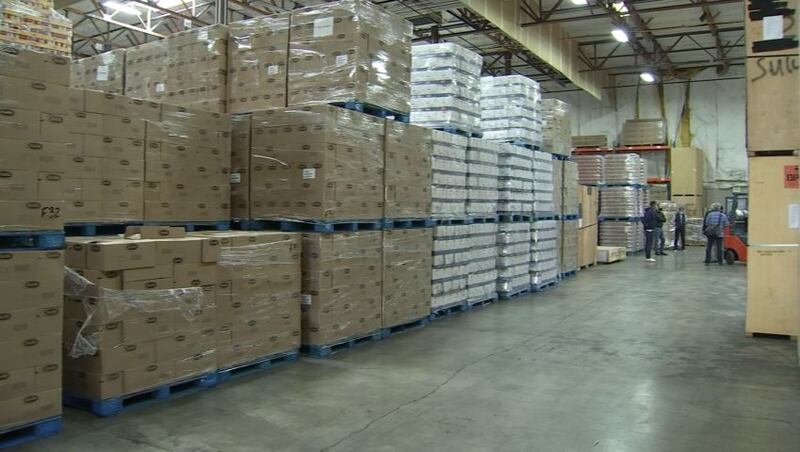Washington state is stockpiling shelf-stable foods in preparation to feed a record number of people in need due to the COVID-19 pandemic.
Officials toured the state’s new COVID strategic reserve at a warehouse in Fife on Friday.
“The purpose of this is to provide sort of a reservoir for shelf stable food that is entering the system to support our hunger prevention efforts around the state,” explained Derek Sandison, the director of the Washington State Department of Agriculture.
He was joined by a handful of other folks including Thomas Reynolds, CEO of Northwest Harvest, which has seen an exponential spike in food insecurity since the pandemic began in March.
“And now here in August we are experiencing a new peak due to the cessation of the enhanced unemployment benefits. We don’t know how long that will last,” Reynolds said.
But the number of people who need help are staggering. KIRO 7 has previous food distributions where folks have lined up and the food was gone in minutes.
The WSDA says in November 2019, 860,000 people a month visited food banks. Today, that number is expected to soar to 2.2 million. To put that in perspective, according to the U.S. Census Bureau, there are 7.6 million people in Washington. So, that would mean more than a quarter of the state’s population would need food.
“The crisis surprised and deeply affected the United States. What I’ve been so impressed with is the state of Washington thinking about smart, executable solutions like this strategic reserve,” added Reynolds.
Northwest Harvest is one of three non-profits the WSDA is partnering with to address hunger. Within 48 hours of communities asking for help, these pallets can be placed on trucks and distributed to food pantries across the state.
The focus is on stockpiling foods like canned vegetables, peanut butter - items that don’t spoil easily. During the early days of the pandemic, they were also hard to come by at times as folks hoarded items, left store shelves bare and disrupted the supply chain.
“They’re in extremely high demand. We’re competing with every other state, competing in some cases with national organizations that are trying to feed America. So its very important we have a good handle on availability and demand for shelf stable products,” said Sandison.
This warehouse has the capacity to hold 2,000 pallets. Currently, there are 1,200 pallets at the facility. While they are packed to the ceiling now, officials know this won’t go very far. Especially since we’re entering the fall and winter where the need in the state typically goes up.
Cox Media Group








